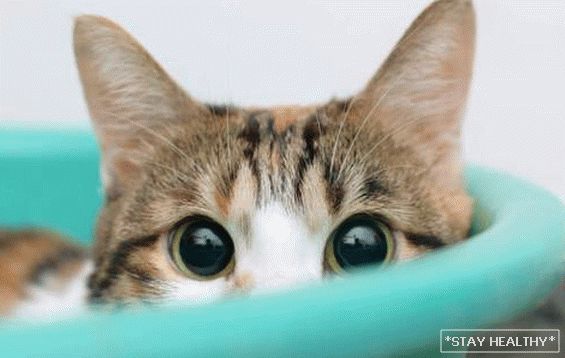 Чт, 01 мар 2018 Автор: Валентина Оболова
Чт, 01 мар 2018 Автор: Валентина Оболова
Feces with blood – a clear sign of problems in the digestive tract. Well visible
scarlet blood, bloody clots or mucous impurities – a sign
damage to the large intestine, the walls of the rectum,
anus. Hidden blood in the feces of cats, the cause of which
there may be pathologies of the liver, stomach, small intestine, visually
not visible, but paints feces in tar color. To eliminate
problem, you need to find out what caused the blood in the feces
cats, what to do in such cases, whether and when to contact
to the vet.
Contents
The main causes of blood in the feces of cats
A number of factors that trigger cat’s bloody stools are associated with
mechanical damage to the intestines and anus. K most likely
include:
– lack of water and pet feeding exclusively dry
feed. Grains of feed do not dissolve in the stomach and injure
intestinal mucosa;
– the formation in the intestines of hairballs – a frequent problem of cats
long-haired breeds;
– getting into the gastrointestinal tract of a foreign body (fragments of bones, plastic,
eaten by the cat pieces of various objects, toys).
The cause of blood in the feces of a cat can be frequent constipation, which
due to malnutrition,
rules of keeping animals and education in the intestines of fallen
lumps of wool. When constipated, tight fecal masses scratch and
injure the intestines. As a result, on the mucous membrane of the rectum, anus,
bleeding and erosion appear in the sphincter area.
Other causes of blood in the feces of cats include:
1. Worm invasions, intestinal parasitic diseases.
2. Infections of a viral nature (calicivirosis, coronovirus,
reovirus, plague, panleukopenia).
3. Diseases of the digestive tract caused by pathogenic bacteria
(salmonellosis, intestinal tuberculosis, colibacteriosis, etc.)
4. Polyps in the intestines.
5. Benign and malignant neoplasms in organs
Gastrointestinal tract.
6. Poisoning by poisons (inorganic and vegetable), which
violate the permeability of blood vessels and worsen
blood clotting.
7 Inversion of intestines caused by coprostasis, flatulence, violation
intestinal peristalsis.
8. Cat prolapse of the rectum, the cause of which may be
prolonged constipation, profuse diarrhea, difficult childbirth.
In addition to the above reasons, the blood in the feces of a cat may be
симптомом заболевания Gastrointestinal tract. Bloody stools – one of the probable
signs of inflammation in the large intestine,
gastroenteritis, gastric ulcer, pancreatitis, enteritis.
With these pathologies, blood in the stool of the animal appears as
clots either stain feces into a uniform rusty brown or
pink color.
Blood in the feces of the cat: what to do to the owner
If the phenomenon is not permanent, not accompanied
other alarming symptoms and almost no effect on
pet’s behavior, you can try to solve the problem yourself.
First you need to review and adjust the diet home
favorite.
What to do when blood in the cat’s feces comes from
malnutrition:
– to give more liquid, which not only helps to establish
digestion, but also helps to eliminate toxins from the body;
– add to the diet foods and pharmaceutical preparations that are rich
plant fiber;
– exclude from the diet of cats on natural nutrition fat,
salted, marinated, smoked, sweet, sausages, canned
people;
– change the brand of dry food or, after consulting with
veterinarian, put a cat on a diet with another source of protein.
If suspected helminthic invasion is necessary
animal deworming with a wide spectrum of drugs
actions.
Long-haired cats for breeding and prevention of education
lumps of wool in the intestines give special Malpasti or top dressing.
Such preparations help to clean the intestines of felted wool and
предупреждают образование пилобезоаров в Gastrointestinal tract.
If the measures taken did not take due action and
cat feces still have blood interspersed, you need to contact
к to the vet. Urgent veterinary care is needed when, in addition to
bloody stools such symptoms are observed:
– lack of appetite;
– vomiting;
– apathy;
– painful stools;
– diarrhea or constipation;
– high temperature.
All these are signs of severe internal pathology, diagnosis and
treatment of which without professional knowledge is impossible.
Blood in the feces of a cat: what does the vet do on examination
Diagnosis of a problem or illness that caused
pet blood in feces begins with a standard
visual inspection. In parallel, the doctor asks questions to help
to diagnose.
Common questions in such situations:
1. What is the diet of the animal.
2. What feeds are used.
3. Could a cat swallow some foreign object?
4. How often is the treatment of worms.
5. When and what vaccinations did the animal.
6. Are there any signs of atypical behavior?
booty on the floor).
7 What other symptoms of health problems appear in
recent times.
After examining and collecting history, the veterinarian may prescribe
laboratory tests and diagnostic procedures to help
find out the cause of blood in the feces of a cat:
– blood and urine tests;
– analysis of feces for the presence of worms;
– ultrasound;
– coprogram;
— рентген органов Gastrointestinal tract.
In some cases, the studies do not give a complete
information on the causes of the problem. Then the method is applied
therapeutic diagnosis. Veterinarian develops treatment regimen
and evaluating the cat’s response to therapy makes a diagnosis.
Cat blood in feces: what to do, how to treat
The direction of treatment depends on the diagnosis. In any
If there is blood in the feces, the veterinarian will prescribe:
– vitamin and mineral complexes;
– digestive enzyme preparations
process;
– antibiotics that suppress the pathogenic intestinal microflora;
– disinfecting enemas;
– drugs that improve blood clotting;
– iron-containing drugs for the prevention of anemia.
If blood in a cat’s blood comes from improper feeding,
ration correction is carried out to restore work
Gastrointestinal tract.
When helminthic invasions are deworming. When clogged
passages of the small intestine use hairballs;
contributing to their dissolution and painless removal from
organism.
In other cases, based on the diagnosis, the cat
prescribe immunomodulators, drugs that strengthen the immune system,
antiviral or antibacterial drugs, serums,
aimed at normalizing the functions of the liver, stomach, pancreas
glands.
If the organs of the digestive tract of the animal are severely injured by shrapnel
bones, foreign bodies or a cat swallowed an object that is not
can come out naturally by treatment
surgical intervention. The operation is performed by a veterinary surgeon.
Follow-up rehabilitation and rehabilitation therapy
conducted under the direction and supervision of a physician.






